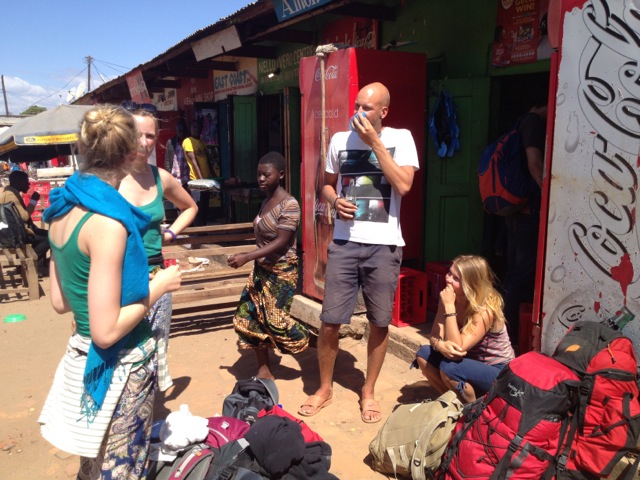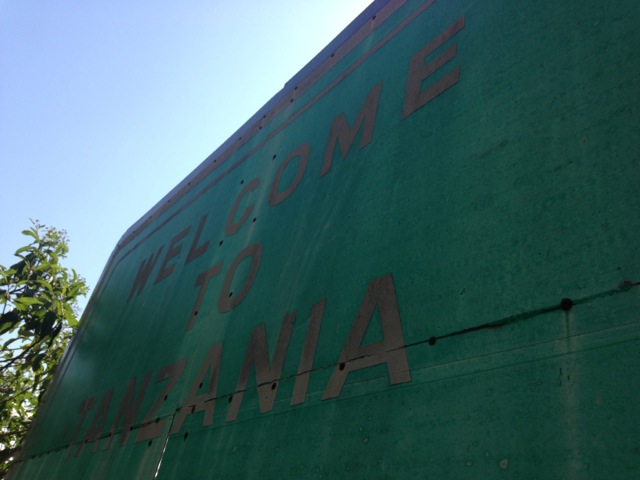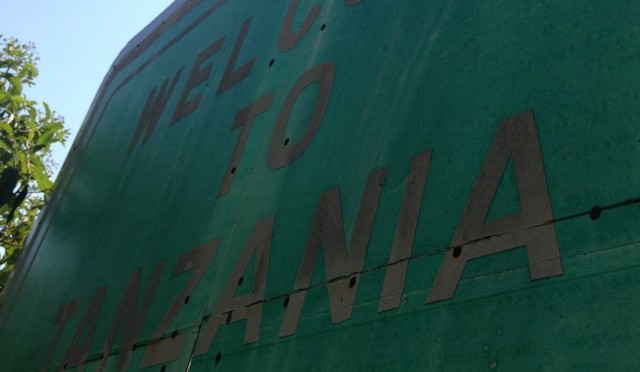Regular readers of this blog know that this adventure has not been about traveling in style. Rather, we’ve been stuck in the middle of near-revolts on minibuses, crammed onto long-distance buses full of cargo, and sold from minibuses to shared taxis like chattel. Luckily, those less-than-comfortable trips must have earned us some good travel karma because our journey from Malawi to Tanzania went surprisingly smoothly.
Pretty much since our arrival in Nkhata Bay, we Marc had been evaluating our options for onward travel. The front-runner of these options was taking a bus that passed through (but did not originate in) Mzuzu just before midnight, arriving in Dar es Salaam the next evening.1 We changed our minds after hearing from new friends who left Nkhata Bay for Tanzania a few days before we did: When the midnight bus arrived in Mzuzu, there were no seats for them, despite the fact that they held tickets for the journey on to Dar,2 and they had to take a taxi all the way to the Tanzanian border and then wait there until it opened in the morning.
Instead of rolling the dice with that bus, we decided to make the trip to Tanzania in separate stages. We started with a 5:00 a.m. taxi to Mzuzu that we shared with the Finnish couple we had met. It was a much more comfortable option than taking a minibus to Mzuzu and it deposited us at the open door of a bus heading north to Karonga just minutes before its scheduled 6:30 a.m. departure.3 You really can’t beat door-to-door service!
In Karonga, we encountered our biggest delay: finding somewhere to exchange Malawian kwachas into U.S. dollars.4 We eventually admitted defeat and commenced the next stage of our journey: a minibus to the Tanzanian border.

After joining forces with a pair of Scottish girls that we had met on the bus from Mzuzu, the six of us navigated the throng of aggressive minibus touts and found ourselves some transportation. One of the benefits of traveling en masse is that it takes that much less time for the minibus to fill up and depart. (One of the less enticing aspects is that other minibus passengers will be so surprised to see such a large contingent of mzungus5 on their transportation that they will attempt to surreptitiously photograph you — especially when one of your companions is extremely blonde.)
It was a fairly quick (less than an hour) ride to the border, and in short order we had stamped out of Malawi and walked across the Songwe River into Tanzania. After purchasing our Tanzanian visas6 and flashing our yellow fever certificates, we parted ways with the Scottish girls (whose father met them at the border) and hiked with the Finns the one kilometer into the border town of Kasumulu to find the bus stop.

In one of the more unintentionally amusing questions we have heard, the man selling tickets for the bus to Mbeya looked the four of us over and asked, “Who is your leader?” All he wanted to know was who was going to fork over the cash for our tickets. After we had paid, we were off on the next leg of our journey: our first Tanzanian bus. The bus wasn’t as large as a long-distance coach bus but was larger than a minibus, and the trip wasn’t half bad.
In fact, we didn’t encounter any glitches until the bus reached its final destination. First, there was a half-hearted – and, in retrospect, humorously amateurish – attempt to collect a previously-undisclosed fare for transporting our backpacks after they had been unloaded and were already mostly on our backs.
Of more concern was the fact that the bus deposited us at a bus depot several kilometers outside of the center of Mbeya, rather than the main, long-distance bus station in the middle of town. None of us had reserved any accommodation, but we had all planned to stay at one of the inexpensive hotels located across the street from the long-distance bus station. Someone directed us to a minibus that was heading to that bus station, but, as we noted with dismay, the minibus was completely empty. Since minibuses don’t depart until they are full, we estimated departure was still a long ways off. The sun was already beginning to set at this point and we loathed the idea of arriving in a strange town with nowhere to stay after dark, carrying all of our bags. After some brief discussion and negotiation, we hired the minibus as a private transfer.
Let me tell you, if you want to feel like a big deal, chartering a minibus in Africa is the way to go – bonus points if it has a mini-disco ball inside, like this one did.
Where We Stayed:
☆ Nkwenzulu Motel. One goat. This place has two main selling points: (i) its location directly across the street from the bus station, making it easy to catch a bus out of town; and (ii) it’s better than the hotel we planned to patronize, which only had squat toilets (*shudder*). In general, things were hit or miss: there was no shower, but an abnormally large bathtub; the water erupted from the sink with surprising force, soaking my pants without fail each time I washed my hands; our room had a television with a few satellite channels, but it lacked a remote (until we nabbed one from the entryway); and dinner was, for lack of a better word, weird. We ordered from the oral menu (which was, verbatim: “We have chicken. We have fish. We have chips. And we have rice.”) and ended up with an oddly inconsistent array (two of us ordered fish and received wildly different dishes, one of us got chips when he had asked for rice, and there was a mysterious dish of beans that didn’t seem to belong to any of our meals) and no forks (my request for a fork resulted in receiving a knife).
1 When we serendipitously met James in Mzuzu on our way to Nkhata Bay, he was in town purchasing tickets on this very bus for other guests.
2 Unfortunately, their experience was not out of the ordinary. As we had already learned on a prior bus trip in Zimbabwe, and would experience again further into our Tanzanian travels, getting on a long-distance bus at any point other than its origin can be a miserable affair. The fact that someone will sell you a ticket for part of the journey does not necessarily mean that you have secured a seat – much less a quasi-comfortable one – and/or any space for your baggage.
3 Note for other travelers: We took an AXA Deluxe Coach (the same bus line we had taken from Lilongwe to Mzuzu). AXA runs three different classes of busses. The “Deluxe” buses are its middle offering, notably featuring 2×2 seating and express service, making only limited stops (versus 2X3 seating and frequents stops on its basic “Commuter” busses). In our experience, the AXA Deluxe busses leave on time and are a fairly comfortable ride (quality of the roads notwithstanding).
4 Our traveling companions needed to get U.S. dollars to pay the Tanzanian visa fee – which is bizarrely, albeit not uniquely, only payable in U.S. dollars – and we had ended up with more kwacha than anticipated and were looking for a way to liquidate them. Although our attempts to change money in Karonga proved unsuccessful, there was a foreign exchange bureau at the border.
5 Swahili slang for “white people.” Of course, given the propensity of people in East Africa to shout “mzungu!” at us, you might think it was my name.
6 Frustratingly, Tanzania charges Americans twice the amount that other nationalities pay for a visa. We paid $100 each for our visas, the Scots and Finns paid $50 each.


